Can Cats Eat Pepperoni? What You Need to Know
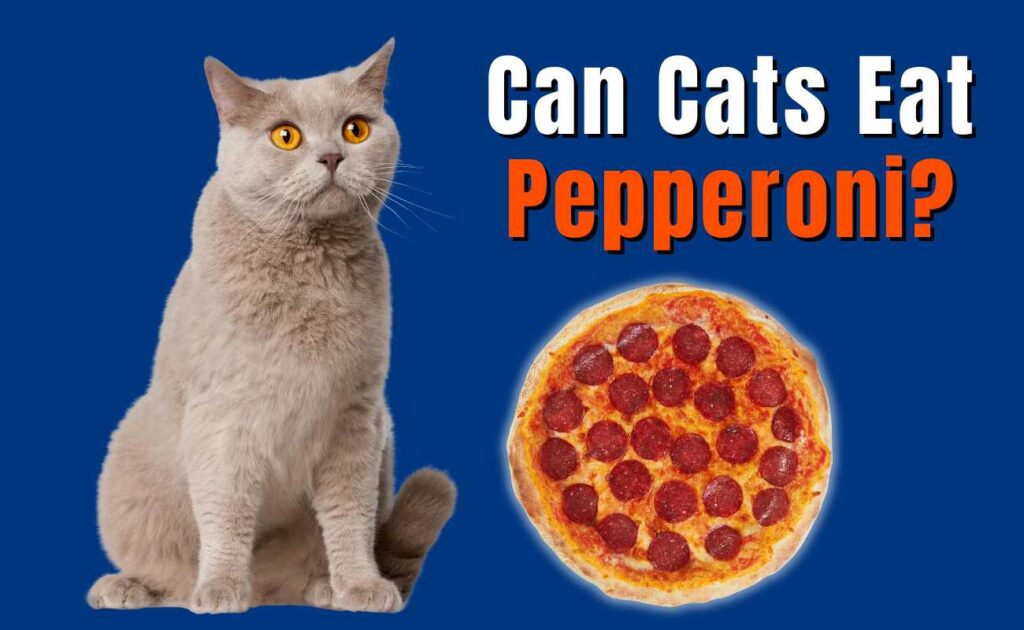
Cats are known for being curious creatures, often showing interest in our meals. One food that might catch their attention is pepperoni, a popular spicy sausage often found on pizzas and in sandwiches. But as a responsible cat owner, you might wonder: can cats eat pepperoni? In this article, we will explore whether pepperoni is safe for cats and what you should know before sharing your snack with your furry friend. What is Pepperoni? Pepperoni is a type of cured sausage made from pork and beef and is seasoned with a mixture of spices like paprika, garlic powder, and chili pepper. It is also high in fat and salt, which gives it a strong flavor. Because pepperoni is a processed meat, it often contains preservatives like nitrates and nitrites to keep it fresh and enhance its color. While pepperoni is a tasty treat for humans, especially when added to a cheesy pizza, its ingredients can be quite different from what a cat’s natural diet should include. Cats are obligate carnivores, meaning their diet should mainly consist of meat. However, not all meats are created equal, and the spices and additives in pepperoni can be harmful to cats. Can Cats Eat Pepperoni? Technically, a cat can eat pepperoni, but that doesn’t mean they should. Pepperoni is not toxic in small amounts, but it’s far from being a healthy choice for your cat. There are several reasons why pepperoni is not suitable for cats, even as an occasional treat. The biggest concern is the high salt content in pepperoni. Cats do not need much salt in their diet, and consuming too much can lead to serious health problems like dehydration and kidney issues. Additionally, the spices used in pepperoni, such as garlic and onion powder, can be toxic to cats even in small amounts. What Happens if a Cat Eats Pepperoni? If your cat accidentally eats a small piece of pepperoni, it might not cause immediate harm, but it’s still essential to monitor them closely. Watch for any signs of discomfort or illness, such as vomiting, diarrhea, excessive thirst, or changes in behavior. If you notice any of these symptoms, it’s a good idea to contact your veterinarian right away. In most cases, a small amount of pepperoni won’t be fatal, but it can make your cat feel unwell. The high salt content may make them thirsty, and the spices could upset their stomach. Keep an eye on your cat, and if they seem okay after a few hours, they likely haven’t suffered any serious harm. However, it’s always better to be safe than sorry when it comes to your pet’s health. Conclusion While it might be tempting to share a piece of pepperoni with your curious cat, it’s best to keep this spicy snack for yourself. Pepperoni contains high levels of salt, fat, and spices that can be harmful to cats, even in small amounts. Instead, opt for safer, cat-friendly treats that will keep your pet healthy and happy. Remember, when it comes to your cat’s diet, always prioritize their well-being over their curiosity. If you’re ever unsure about whether a certain food is safe for your cat, it’s always a good idea to consult with your veterinarian. Keeping your cat healthy is the most important thing, and that means being cautious about what foods they consume. So, next time you enjoy a slice of pepperoni pizza, make sure to keep it out of reach of your furry friend!
Can Dogs Eat Pepperoni? What Every Pet Parent Needs to Know!
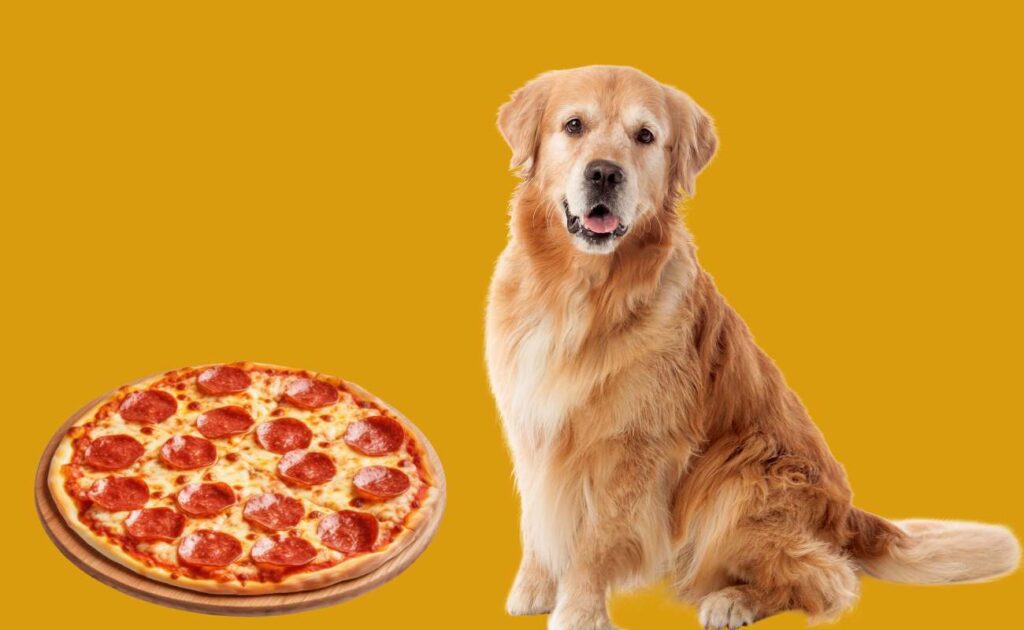
It’s a common scene: you’re eating a snack, and your dog looks at you with that expectant puppy gaze. Most dog owners will have the urge to share their food with their pet, but is it okay to slide that ring down to your hairy buddy when it comes to pepperoni? As tasty as pepperoni is to people, the answer for dogs isn’t quite as clear-cut. Below we will take a look at the nutritional facts about pepperoni, its effects on dogs, and if it can be included as part of the diet for your dog. What is Pepperoni? Pepperoni is a spicy sausage made from a mix of pork and beef, seasoned with ingredients like paprika, garlic, and chili powder. It’s well-known for its robust flavor and is a popular choice as a pizza topping or a standalone snack. The seasoning gives pepperoni its characteristic zest, while preservatives such as sodium nitrate help extend its shelf life and maintain its flavor. However, while pepperoni is a delicious treat for humans, it raises several concerns when it comes to feeding it to dogs. The high fat content in pepperoni can be problematic for dogs, potentially leading to weight gain and obesity. Additionally, the high levels of salt and spices, including garlic, can be harmful to pets. Garlic is particularly dangerous as it can damage a dog’s red blood cells, leading to anemia. The preservatives used in pepperoni also pose risks, as they can affect a dog’s digestive system and overall health. Is Pepperoni Safe for Dogs? Short answer: No, pepperoni is not safe for dogs. The ingredients in pepperoni can prove harmful to the dog’s health because it contains high levels of fat, salt, and spices. These ingredients may result in several health problems, from mild stomach upset to serious conditions like pancreatitis or heart disease. High Fat Content: Pepperoni is very high in fat. Dogs don’t need as much fat in their diet as humans, and a diet high in fatty foods can contribute to putting on weight and obesity. Overweight dogs are subjected to joint pain, diabetes, and related problems. Over-fatness can also be a cause of very serious painful life-threatening pancreatitis, an inflammation of the pancreas. High Levels of Sodium (Salt): Pepperoni is a high-salt product used for seasoning and preserving its freshness. However, a dog’s body isn’t made to handle vast amounts of salt. Feeding salty food to dogs, such as pepperoni, can result in salt poisoning, causing vomiting, diarrhea, tremors, and, in severe cases, death. It will even take small levels of pepperoni to bring dehydration and stress to your dog’s kidneys. Spices and Seasonings: People typically spice up their pepperoni with garlic and paprika. Garlic is very toxic to dogs. In fact, it has been found that garlic can bring about oxidative damage in red blood cells, and hemolytic anemia may follow suit. Other spices such as chili powder might upset the gastrointestinal system of your dog, leading to stomach upsets and diarrhea. Conclusion Pepperoni is a delicacy for humans, but it should not be served as a treat to dogs. High fat, salt, and spices in pepperoni are the three problems that could make many different health issues arise, from stomach upset to serious conditions like pancreatitis and heart disease. Although a small amount may not be immediately harmful, it’s always better to be safe rather than sorry and not feed pepperoni to your dog. Instead, choose better, safer treats for them, like carrots, apples, or even specially formulated doggie treats. After all, the health of your dog is paramount, so ensure that their diet consists of food that is good for them. If in doubt, be sure to check with your veterinarian to ensure you make the best decisions regarding your pet’s diet.
Can Cats Eat Salami?
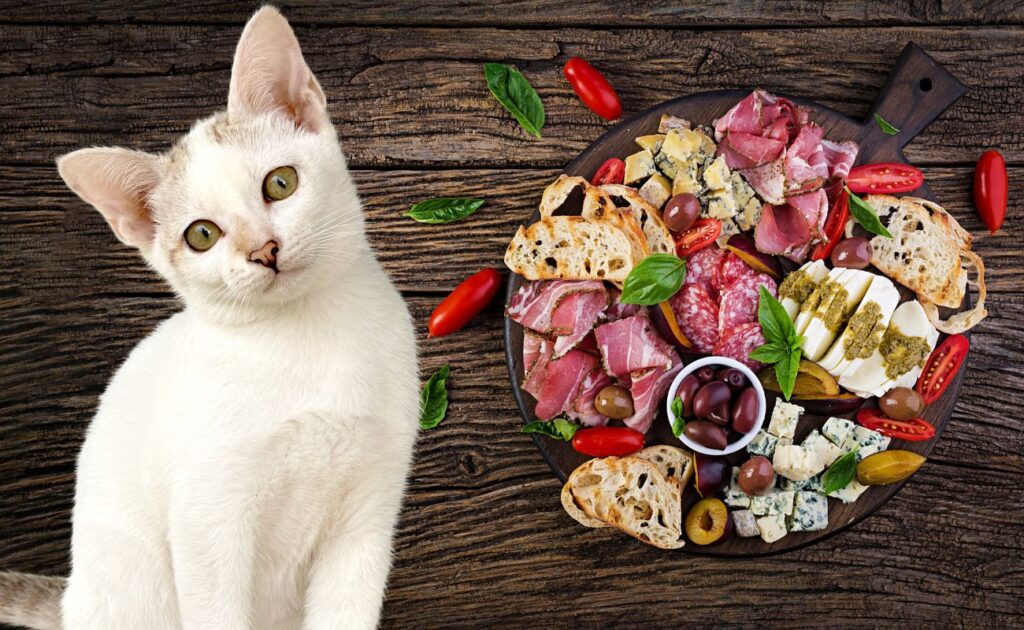
When it comes to feeding our feline friends, we often wonder if certain human foods are safe for them. One such query that arises frequently is: can cats eat salami? This article aims to provide a comprehensive understanding of whether salami is a safe treat for your cat. Understanding Salami Can Cats Eat Salami? Salami is a type of cured sausage made from fermented and air-dried meat, typically pork. It contains various spices, salt, and sometimes even preservatives and additives. While these ingredients make salami a flavorful addition to human diets, they might pose risks to cats. The high salt content and the presence of spices and preservatives can be harmful to felines. Salt can lead to excessive thirst and urination, while spices might cause gastrointestinal upset. Furthermore, certain additives in processed meats like salami can be toxic to cats. Nutritional Needs of Cats Cats are obligate carnivores, meaning their diet should primarily consist of meat. Their nutritional requirements are distinct from those of humans and even dogs. They need specific nutrients like taurine, arachidonic acid, and vitamin A, which are found in meat. However, not all meat-based products are suitable for cats. While plain, cooked meat can be beneficial, processed meats like salami do not provide the necessary nutrients and can be detrimental due to their high fat and sodium content. Nutrient Amount Per 100g Calories 407 kcal Protein 22.6 g Total Fat 34.3 g Saturated Fat 12.3 g Monounsaturated Fat 16.5 g Polyunsaturated Fat 2.5 g Cholesterol 85 mg Sodium 1780 mg Potassium 306 mg Total Carbohydrates 1.9 g Dietary Fiber 0 g Sugars 0 g Calcium 20 mg Iron 1.5 mg Magnesium 20 mg Phosphorus 180 mg Zinc 2.5 mg Vitamin A 17 µg Vitamin C 0 mg Vitamin B6 0.4 mg Vitamin B12 1.8 µg Thiamin (Vitamin B1) 0.6 mg Riboflavin (Vitamin B2) 0.3 mg Niacin (Vitamin B3) 4.5 mg Folate (Vitamin B9) 5 µg Vitamin E 0.3 mg Vitamin K 2.5 µg Potential Health Risks of Feeding Salami to Cats Feeding salami to cats can lead to several health issues. The high fat content in salami can contribute to obesity and pancreatitis in cats. Obesity in cats can lead to diabetes, arthritis, and other health complications. Additionally, the high sodium content in salami can cause hypertension and kidney problems. Regular consumption of salami can also upset a cat’s digestive system, leading to diarrhea or vomiting. Moreover, the presence of garlic and onion powder in some salami recipes can be toxic to cats, causing damage to their red blood cells. What To Do If Your Cat Eats Salami If your cat accidentally consumes a small amount of salami, it might not cause immediate harm. However, it is important to monitor your cat for any signs of discomfort or illness, such as vomiting, diarrhea, excessive thirst, or lethargy. In case your cat shows any adverse symptoms, it is advisable to consult a veterinarian immediately. They can provide guidance on whether further medical intervention is needed. Safe Alternatives to Salami for Cats Instead of feeding your cat salami, consider healthier alternatives that meet their nutritional needs. Cooked chicken, turkey, or lean beef can be excellent protein sources for cats. These meats should be cooked plain, without any added salt, spices, or seasonings. Additionally, there are numerous commercially available cat treats formulated to provide the right balance of nutrients. Always ensure that any treat you offer your cat is specifically designed for feline consumption and adheres to their dietary requirements. Summary: Can Cats Eat Salami? In conclusion, while cats can technically eat salami, it is not advisable due to the potential health risks associated with its consumption. The high fat, sodium, and spice content in salami can lead to various health problems in cats, including obesity, pancreatitis, hypertension, and digestive issues. As responsible pet owners, it is crucial to provide our cats with a diet that supports their health and well-being. Opt for safer, healthier alternatives to salami to ensure your feline friend stays happy and healthy. By understanding the potential risks and making informed choices, you can help your cat live a long, healthy, and fulfilling life. Remember, when in doubt, always consult with your veterinarian regarding your cat’s diet and nutritional needs.
Can Dogs Eat Salami?
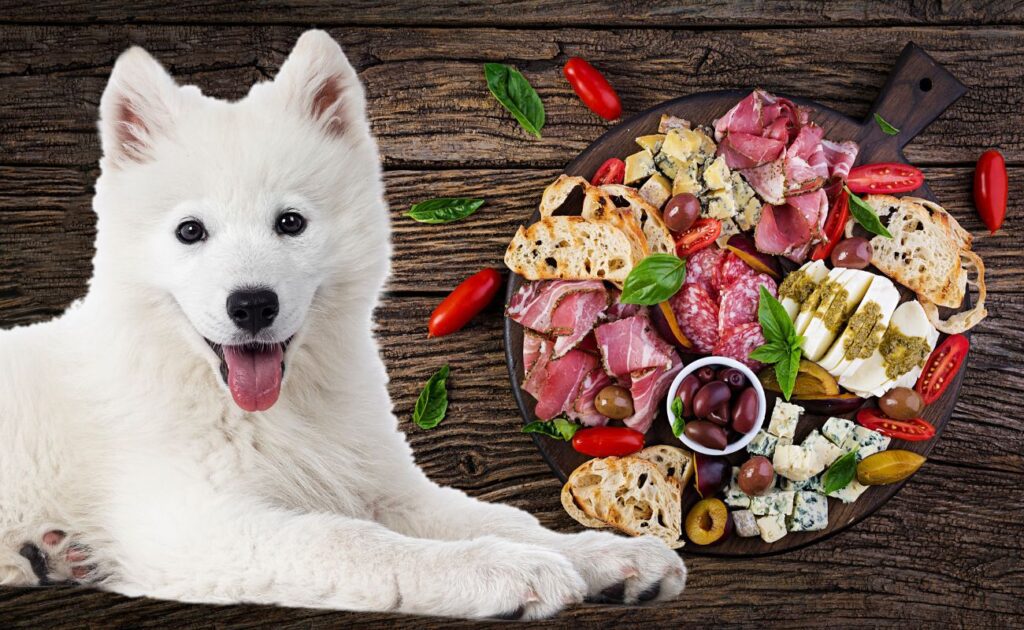
As pet owners, we often wonder if our furry friends can enjoy the same foods we do. One common query is, “can dogs eat salami?” While it might be tempting to share this savory treat with your dog, it’s important to understand the potential risks and benefits. In this article, we will delve into whether dogs can safely consume salami, the potential health risks, and what alternatives you might consider. What is Salami? Salami is a type of cured sausage made from fermented and air-dried meat, typically pork. It’s seasoned with various spices and herbs, and often contains ingredients like garlic, salt, and nitrates. These ingredients, while delicious to humans, can pose certain health risks to dogs. Before deciding to give your dog a slice of salami, it’s crucial to understand its composition and potential impact on their health. Can Dogs Eat Salami? The short answer to the question “can dogs eat salami?” is no, it is not recommended. While a small piece of salami occasionally might not harm your dog, regular consumption can lead to significant health issues. Salami contains high levels of sodium and fat, which are not suitable for dogs in large amounts. Additionally, ingredients like garlic and certain spices can be toxic to dogs. Nutritional value: Here’s a detailed table of the nutritional value of salami per 100 grams: Nutrient Amount Per 100g Calories 407 kcal Protein 22.6 g Total Fat 34.3 g Saturated Fat 12.3 g Monounsaturated Fat 16.5 g Polyunsaturated Fat 2.5 g Cholesterol 85 mg Sodium 1780 mg Potassium 306 mg Total Carbohydrates 1.9 g Dietary Fiber 0 g Sugars 0 g Calcium 20 mg Iron 1.5 mg Magnesium 20 mg Phosphorus 180 mg Zinc 2.5 mg Vitamin A 17 µg Vitamin C 0 mg Vitamin B6 0.4 mg Vitamin B12 1.8 µg Thiamin (Vitamin B1) 0.6 mg Riboflavin (Vitamin B2) 0.3 mg Niacin (Vitamin B3) 4.5 mg Folate (Vitamin B9) 5 µg Vitamin E 0.3 mg Vitamin K 2.5 µg These values can vary slightly based on the specific type and brand of salami. Always check the packaging for the most accurate nutritional information. Health Risks of Salami for Dogs High Sodium Content Salami is notorious for its high sodium content. Dogs require much less sodium than humans, and excessive salt can lead to dehydration, high blood pressure, and even sodium ion poisoning. Symptoms of salt poisoning include vomiting, diarrhea, tremors, and seizures, which require immediate veterinary attention. High Fat Content The high fat content in salami can lead to obesity and pancreatitis in dogs. Pancreatitis is a painful condition where the pancreas becomes inflamed, leading to digestive issues and severe abdominal pain. Chronic consumption of high-fat foods like salami can significantly increase the risk of this condition. Toxic Ingredients Many types of salami contain ingredients like garlic and onions, which are toxic to dogs. Even in small amounts, these ingredients can cause hemolytic anemia, a condition where red blood cells are destroyed faster than they can be made. Symptoms include weakness, lethargy, and pale gums. What to Do If Your Dog Eats Salami If your dog accidentally consumes a small amount of salami, monitor them closely for any adverse reactions. Symptoms to watch for include vomiting, diarrhea, excessive thirst, and lethargy. If your dog shows any of these signs or if they have consumed a large amount, contact your veterinarian immediately. Healthy Alternatives to Salami for Dogs Instead of giving your dog salami, consider these healthier alternatives: Lean Meats: Cooked chicken, turkey, or beef without any seasoning can be a great source of protein. Vegetables: Carrots, green beans, and cucumber slices are low-calorie treats that many dogs enjoy. Fruits: Apples (without seeds), blueberries, and watermelon (without seeds) are safe and nutritious options. Homemade Dog Treat Recipes Making homemade treats is a great way to ensure your dog is getting healthy snacks. Here are a couple of easy recipes: Chicken Jerky Ingredients: 2 chicken breasts Instructions: Preheat your oven to 200°F (93°C). Slice chicken breasts into thin strips. Place the strips on a baking sheet lined with parchment paper. Bake for 2 hours or until the chicken is fully dried and crispy. Let it cool before serving to your dog. Peanut Butter Biscuits Ingredients: 2 cups whole wheat flour 1/2 cup natural peanut butter (xylitol-free) 1 cup water Instructions: Preheat your oven to 350°F (175°C). Mix all ingredients in a bowl until a dough forms. Roll out the dough and cut into shapes with a cookie cutter. Place on a baking sheet lined with parchment paper. Bake for 20 minutes or until golden brown. Let them cool before giving them to your dog. Conclusion: Can Dogs Eat Salami? In conclusion, while it might be tempting to share your salami with your dog, it is best to avoid it due to the high levels of sodium, fat, and potentially toxic ingredients. There are many healthier alternatives and treats that you can offer your dog to ensure they stay healthy and happy. Remember, when in doubt, always consult your veterinarian before introducing new foods into your dog’s diet. By keeping your dog’s diet safe and nutritious, you can ensure they enjoy a long, healthy, and happy life by your side. So next time you wonder, “can dogs eat salami?” you’ll know the answer and can make a well-informed decision for your furry friend.
Can Cats Eat Vienna Sausages?
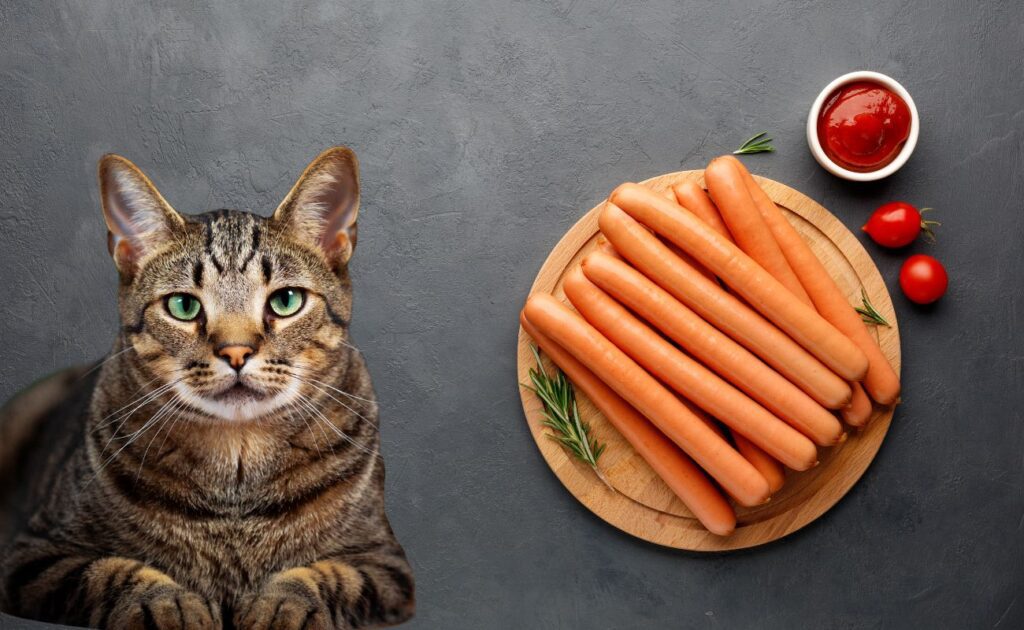
Cats are known for their selective eating habits, and as responsible pet owners, it’s essential to understand what foods are safe for our feline friends. One question that often arises is, can cats eat Vienna sausages? Let’s explore this topic in detail. What Are Vienna Sausages? Vienna sausages are small, thin sausages made from a mixture of meats, such as pork, beef, and chicken, and they are usually seasoned with various spices. They are typically sold canned and are known for their soft texture and distinct flavor. While they are a popular snack for humans, it’s crucial to consider whether they are suitable for cats. Nutritional Content of Vienna Sausages Before deciding if cats can eat Vienna sausages, it’s important to understand their nutritional content. Vienna sausages are high in protein, which is essential for cats. However, they also contain significant amounts of sodium, fat, and preservatives. High sodium content can be harmful to cats, leading to issues such as dehydration and kidney problems. Additionally, the high fat content can contribute to obesity and related health issues in cats. Nutrient Amount per 100g Calories 280 kcal Total Fat 24 g Saturated Fat 8 g Trans Fat 0.5 g Cholesterol 90 mg Sodium 950 mg Total Carbohydrates 2 g Dietary Fiber 0 g Sugars 0 g Protein 11 g Vitamin A 0% DV Vitamin C 0% DV Calcium 2% DV Iron 6% DV Are Vienna Sausages Safe for Cats? Can cats eat Vienna sausages? The short answer is no, Vienna sausages are not safe for cats. The high sodium content and presence of various spices and preservatives make them unsuitable for feline consumption. Cats have specific dietary needs, and foods high in sodium and preservatives can lead to severe health problems. It’s always best to stick to cat-friendly foods and avoid giving them human snacks like Vienna sausages. Potential Health Risks Feeding Vienna sausages to cats can pose several health risks. The high sodium content can cause sodium ion poisoning, which can be fatal in severe cases. Symptoms of sodium ion poisoning include vomiting, diarrhea, lethargy, tremors, and seizures. Moreover, the high fat content can lead to obesity, pancreatitis, and other digestive issues. The spices and preservatives used in Vienna sausages can also irritate a cat’s digestive system, leading to discomfort and health problems. What to Do If Your Cat Eats Vienna Sausages If your cat accidentally consumes Vienna sausages, monitor them closely for any signs of distress or illness. Symptoms to watch for include vomiting, diarrhea, excessive thirst, lethargy, and abdominal pain. If any of these symptoms occur, contact your veterinarian immediately. They can provide appropriate advice and treatment to ensure your cat’s safety and well-being. Healthy Alternatives to Vienna Sausages Instead of Vienna sausages, consider offering your cat healthier alternatives that are safe and nutritious. Some suitable options include: Cooked Meat: Lean, cooked meats like chicken or turkey without any seasoning can be a great treat for your cat. Cat Treats: Commercially available cat treats are specifically formulated to meet the nutritional needs of cats and are a safe choice. Canned Cat Food: High-quality canned cat food can provide the necessary nutrients and a similar texture to Vienna sausages without the harmful additives. Summary: Can Cats Eat Vienna Sausages? In conclusion, can cats eat Vienna sausages? No, they cannot. The high levels of sodium, fat, and preservatives make Vienna sausages an unhealthy choice for cats. It’s essential to prioritize your cat’s health by providing them with safe, nutritious foods and avoiding potentially harmful human snacks. Always consult with your veterinarian if you have any concerns about your cat’s diet and well-being. By understanding the risks and making informed decisions, you can ensure that your feline companion remains healthy and happy. Remember, a proper diet is key to your cat’s overall health and longevity.
Can Dogs Eat Vienna Sausages?

Vienna sausages are a popular snack for humans, but as a dog owner, you might wonder, “Can dogs eat Vienna sausages?” It’s essential to understand the potential risks and benefits of feeding these treats to your furry friend. This blog post delves into the details to help you make an informed decision about whether Vienna sausages are safe for dogs. What Are Vienna Sausages? Vienna sausages are small, canned sausages made from a mixture of meats, typically including pork, beef, and chicken. They are seasoned with various spices and often contain preservatives to extend their shelf life. While they are a convenient and tasty snack for humans, their suitability for dogs is questionable due to their ingredients and nutritional content. Ingredients in Vienna Sausages Understanding what goes into Vienna sausages is crucial when considering them for your dog. The primary ingredients usually include: Meat (pork, beef, chicken): While meat is generally good for dogs, the quality and type of meat used in processed foods can vary. Salt: Vienna sausages are high in sodium, which can be harmful to dogs in large quantities. Preservatives: Chemicals like sodium nitrite are used to prolong shelf life but can be detrimental to your dog’s health. Spices and flavorings: Ingredients such as garlic powder and onion powder are toxic to dogs and should be avoided. Can Dogs Eat Vienna Sausages Safely? The short answer to “Can dogs eat Vienna sausages?” is that it’s not recommended. While a small amount might not cause immediate harm, regular consumption can lead to various health issues due to the high salt content, preservatives, and potentially harmful spices. Health Risks of Vienna Sausages for Dogs Feeding Vienna sausages to dogs can pose several health risks: High Sodium Content: Excessive salt intake can lead to sodium ion poisoning, which causes symptoms like vomiting, diarrhea, tremors, seizures, and even death in severe cases. Preservatives and Additives: Chemicals used to preserve Vienna sausages can be toxic over time, leading to liver and kidney damage. Spices: Ingredients like garlic and onion powder can cause anemia in dogs by damaging their red blood cells. Nutritional Value Nutrient Amount per 100g Calories 280 kcal Total Fat 24 g Saturated Fat 8 g Trans Fat 0.5 g Cholesterol 90 mg Sodium 950 mg Total Carbohydrates 2 g Dietary Fiber 0 g Sugars 0 g Protein 11 g Vitamin A 0% DV Vitamin C 0% DV Calcium 2% DV Iron 6% DV Potential Benefits of Vienna Sausages While the risks often outweigh the benefits, there are a few positive aspects of Vienna sausages: Protein Source: Meat provides protein, which is essential for a dog’s muscle development and overall health. Palatability: Dogs might find Vienna sausages very tasty, making them useful for administering medication or as a very occasional treat. Healthy Alternatives to Vienna Sausages for Dogs Instead of Vienna sausages, consider healthier and safer alternatives that provide similar taste and texture without the associated risks: Cooked Lean Meats: Offer small pieces of cooked chicken, turkey, or lean beef without seasoning or additives. Dog-Specific Treats: Choose treats formulated for dogs that are free from harmful ingredients and provide balanced nutrition. Vegetables and Fruits: Some dogs enjoy vegetables like carrots or fruits like apples (without seeds) as a crunchy and healthy snack. How to Make Homemade Dog-Friendly Sausages If you want to give your dog a sausage-like treat, consider making homemade dog-friendly sausages. Here’s a simple recipe: Ingredients: 1 pound ground chicken or turkey 1 cup rolled oats 1 egg 1/4 cup finely chopped carrots 1/4 cup finely chopped spinach Instructions: Preheat your oven to 350°F (175°C). In a large bowl, mix all the ingredients until well combined. Shape the mixture into small sausage-like rolls. Place the sausages on a baking sheet lined with parchment paper. Bake for 20-25 minutes or until fully cooked. Let the sausages cool before serving them to your dog. These homemade sausages are free from harmful additives and provide a nutritious treat that your dog can safely enjoy. Summary: Can Dogs Eat Vienna Sausages? So, can dogs eat Vienna sausages? While an occasional small piece might not cause immediate harm, it’s best to avoid feeding Vienna sausages to your dog due to their high sodium content, preservatives, and potentially toxic spices. Opt for healthier alternatives like cooked lean meats, dog-specific treats, or homemade dog-friendly sausages to ensure your furry friend stays healthy and happy. Always consult with your veterinarian before introducing any new foods into your dog’s diet to ensure they are safe and suitable for your pet.
Are Chicken Gizzards Good for Cats?
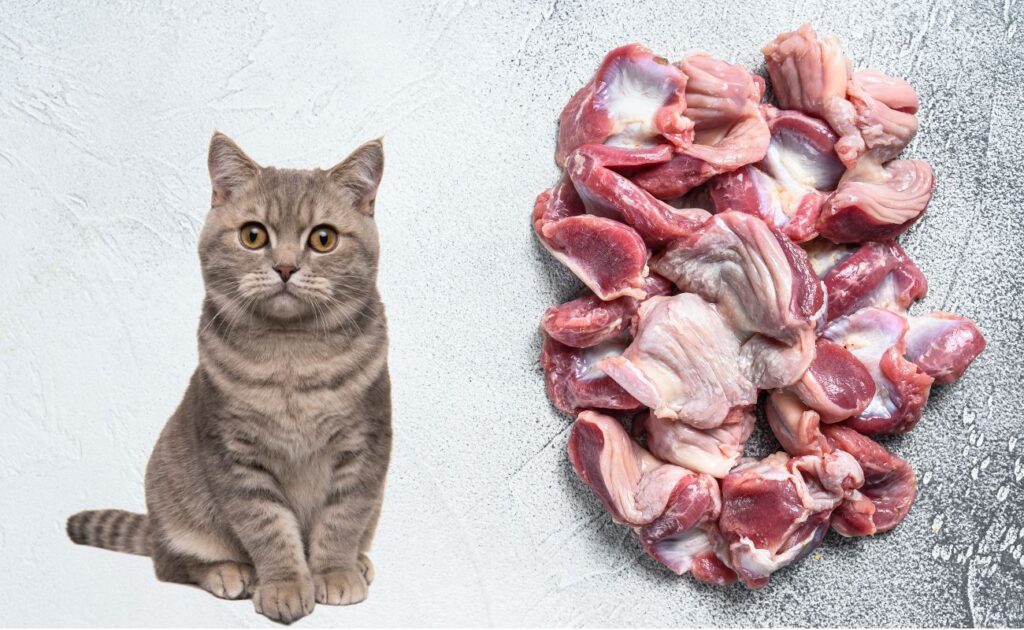
What are Chicken Gizzards? Are chicken gizzards good for cats? Chicken gizzards are a muscular organ found in the digestive tract of chickens. They are rich in protein and essential nutrients, making them a nutritious option for both humans and animals. As cat owners, we always strive to provide our feline friends with the best diet possible. But when it comes to feeding them human foods like chicken gizzards, it’s essential to understand if it’s safe and beneficial. In this comprehensive guide, we’ll delve into the question, “Are chicken gizzards good for cats?” and explore all the essential subtopics to ensure your cat’s health and well-being. Nutritional Value of Chicken Gizzards Chicken gizzards are a good source of Protein Vitamins (including B vitamins) Minerals (such as iron and zinc) Amino acids They are low in fat and carbohydrates, making them a healthy protein option for cats. Here’s a table detailing the nutritional value of chicken gizzards per 100 grams Nutrient Amount Per 100g Calories 94 Protein 19.4g Fat 1.9g Saturated Fat 0.5g Cholesterol 536mg Sodium 111mg Potassium 223mg Iron 4.3mg Vitamin A 106μg Vitamin C 5.0mg Calcium 11mg Please note that these values are approximate and can vary based on factors such as cooking method and the specific diet of the chicken. Benefits of Feeding Chicken Gizzards to Cats Protein-rich: Cats require a diet high in protein to support their muscle growth, maintenance, and overall health. Nutrient-dense: Chicken gizzards provide essential vitamins and minerals that contribute to a well-balanced diet for cats. Dental health: Chewing on chicken gizzards can help promote dental health in cats by reducing plaque and tartar buildup. Risks and Considerations Allergies: Some cats may be allergic to chicken or poultry products, resulting in allergic reactions or digestive upset. Preparation: It’s crucial to prepare chicken gizzards properly to ensure they are cooked thoroughly and free from harmful bacteria like salmonella. How to Prepare Chicken Gizzards for Cats Boil or steam: Cooking chicken gizzards by boiling or steaming them is a safe and easy way to prepare them for your cat. Avoid seasoning: It’s best to avoid adding any seasoning or spices to chicken gizzards when cooking for cats, as these can be harmful to their digestive systems. Introducing Chicken Gizzards into Your Cat’s Diet Start slowly: Introduce small amounts of cooked chicken gizzards into your cat’s diet gradually to allow their digestive system to adjust. Monitor for reactions: Keep an eye on your cat for any signs of allergic reactions or digestive upset when introducing new foods. Signs of Allergic Reactions or Digestive Upset Symptoms may include Vomiting Diarrhea Itching Skin rashes Respiratory issues If you notice any of these symptoms, discontinue feeding chicken gizzards and consult with your veterinarian. Safe Alternatives to Chicken Gizzards for Cats If your cat has allergies or sensitivities to chicken, consider alternative protein sources such as Turkey Fish Beef Commercial cat food formulas specifically formulated to meet feline nutritional needs are also suitable options. Consulting with Your Veterinarian Before making any significant changes to your cat’s diet, it’s essential to consult with your veterinarian. Your veterinarian can provide personalized dietary recommendations based on your cat’s age, health status, and individual needs. Summary: Making Informed Decisions for Your Cat’s Diet While chicken gizzards can be a nutritious addition to your cat’s diet, Yes you can offer chicken gizzards to your Cats in limited amount, consider both the benefits and potential risks. By understanding the benefits and risks associated with feeding chicken gizzards to cats, you can make informed decisions to promote your cat’s health and well-being. Remember, your cat’s diet plays a significant role in their overall health and happiness.
Are Chicken Gizzards Good for Dogs?
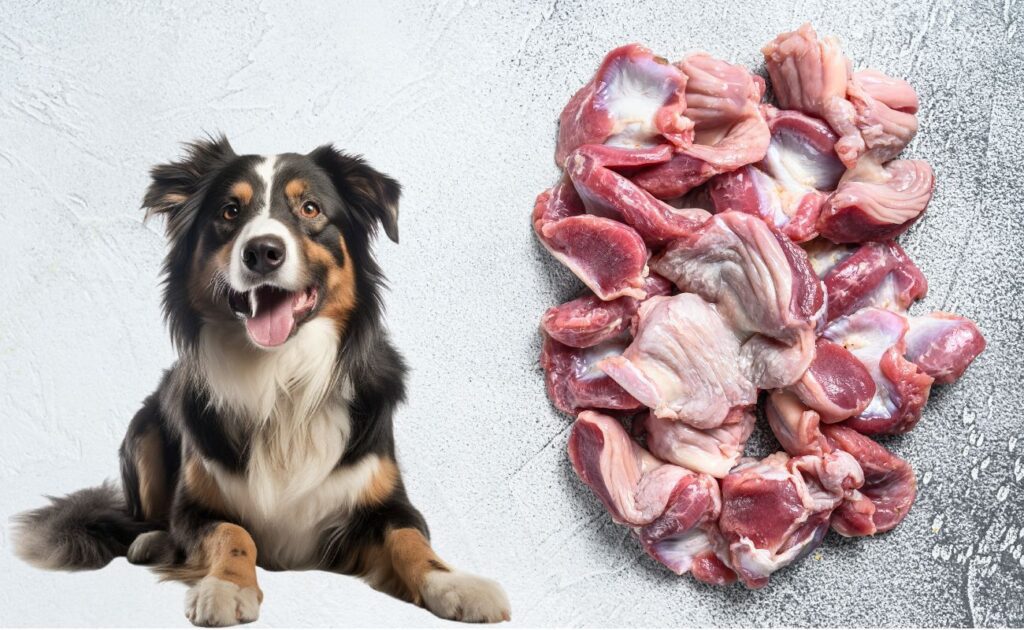
What are Chicken Gizzards? Are Chicken Gizzards Good for Dogs? Chicken gizzards are muscular organs found in the digestive tract of chickens. They play a crucial role in grinding food and aiding in the digestion process. Gizzards have a firm texture and are rich in Protein Vitamins Minerals Are you considering adding chicken gizzards to your dog’s diet? Understanding whether this protein-rich organ meat is beneficial for your furry friend is essential for their overall health and nutrition. In this detailed guide, we’ll explore the question, “Are chicken gizzards good for dogs?” and provide valuable insights to help you make informed decisions about your pet’s diet. Nutritional Value of Chicken Gizzards Chicken gizzards are an excellent source of protein, providing essential amino acids necessary for muscle growth and maintenance. They also contain vitamins such as B12 which supports nerve function, and minerals like Iron Zinc essential for overall health. Here’s a table detailing the nutritional value of chicken gizzards per 100 grams Nutrient Amount Per 100g Calories 94 Protein 19.4g Fat 1.9g Saturated Fat 0.5g Cholesterol 536mg Sodium 111mg Potassium 223mg Iron 4.3mg Vitamin A 106μg Vitamin C 5.0mg Calcium 11mg Please note that these values are approximate and can vary based on factors such as cooking method and the specific diet of the chicken. Benefits of Feeding Chicken Gizzards to Dogs Protein-rich: Chicken gizzards offer a high-quality protein source that can help support muscle development and repair in dogs. Nutrient-dense: Gizzards contain a variety of vitamins and minerals that contribute to your dog’s overall health and well-being. Dental health: Chewing on gizzards can help promote dental health by reducing plaque and tartar buildup on your dog’s teeth. Potential Risks of Feeding Chicken Gizzards to Dogs Allergic reactions: Some dogs may be allergic to chicken or poultry products, leading to adverse reactions such as itching, skin rashes, or digestive upset. Gastrointestinal issues: Introducing new foods, including gizzards, can sometimes cause digestive upset in dogs, such as diarrhea or vomiting. Bone hazard: Gizzards may contain small bone fragments, which could pose a choking hazard or cause gastrointestinal blockages if not properly prepared. How to Prepare Chicken Gizzards for Dogs Thoroughly wash the gizzards to remove any dirt or debris. Remove excess fat and connective tissue from the gizzards. Cook the chicken gizzards thoroughly by boiling, baking, or grilling to ensure they are safe for your dog to consume. Avoid seasoning or adding spices, as they may be harmful to dogs. Introducing Chicken Gizzards into Your Dog’s Diet Start by offering small amounts of cooked gizzards as a treat or topping for your dog’s regular food. Monitor your dog for any signs of allergic reactions or digestive upset after introducing gizzards into their diet. Portion Control and Frequency of Feeding Chicken Gizzards Moderation is key when feeding gizzards to dogs. They should be offered as an occasional treat or part of a balanced diet. Consider your dog’s size, age, and activity level when determining portion sizes. Monitoring Your Dog’s Response to Chicken Gizzards Pay attention to how your dog responds to eating gizzards. Look for any signs of allergic reactions, digestive issues, or changes in behavior. If your dog experiences any adverse reactions, discontinue feeding gizzards and consult with your veterinarian. Alternatives to Chicken Gizzards for Dogs If your dog cannot tolerate chicken gizzards or if you’re looking for alternative protein sources, consider options such as lean meats (e.g., beef, turkey), fish, eggs, or commercial dog food formulated with high-quality ingredients. Consulting with Your Veterinarian Before making significant changes to your dog’s diet, including the addition of chicken gizzards, it’s essential to consult with your veterinarian. Your veterinarian can provide personalized dietary recommendations based on your dog’s individual needs and health status. Summary: Making Informed Choices for Your Dog’s Health Are Chicken Gizzards Good for Dogs? While chicken gizzards can be a nutritious addition to your dog’s diet, Yes you can offer chicken gizzards to your dogs in limited amount, consider both the benefits and potential risks. By understanding how to properly prepare and introduce gizzards into your dog’s diet, monitoring their response, and seeking guidance from your veterinarian, you can make informed choices that support your dog’s health and well-being.

